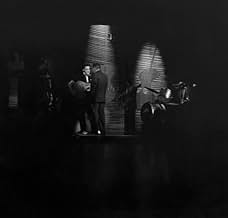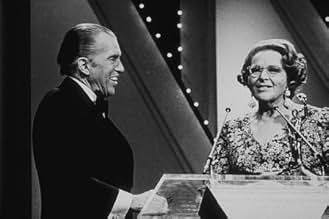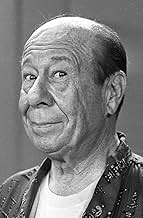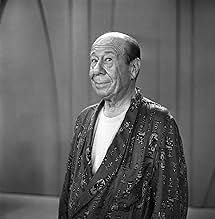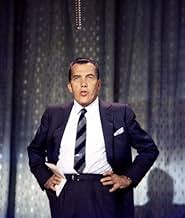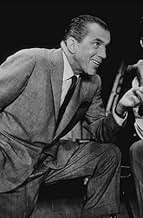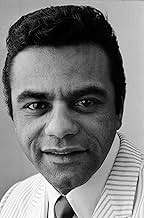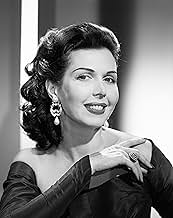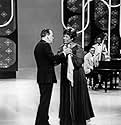IMDb-BEWERTUNG
7,9/10
1662
IHRE BEWERTUNG
Die klassische Varietéshow zur besten Sendezeit ist vor allem für ihre Varieté-Acts und Rockmusikdarbietungen bekannt.Die klassische Varietéshow zur besten Sendezeit ist vor allem für ihre Varieté-Acts und Rockmusikdarbietungen bekannt.Die klassische Varietéshow zur besten Sendezeit ist vor allem für ihre Varieté-Acts und Rockmusikdarbietungen bekannt.
- 1 Primetime Emmy gewonnen
- 6 Gewinne & 7 Nominierungen insgesamt
Folgen durchsuchen
Empfohlene Bewertungen
I've been watching reruns of this show and it is just great!! The music, comedy everything is awesome. I wish there was a show like that around now!!! I can't believe I'm the first one to comment on this great show
Ed Sullivan always had brilliant timing. He came along as a gossip columnist and writer for the New York Daily News, as people were starting to tire of Walter Winchell. And he basically chased Winchell from his seat at the top of the newspaper world with his "Little Old New York" columns.
But also, at that same moment, television was in its infancy, and someone had to create programming for people to watch. Sullivan was a smart choice to use as a host, as he was already known by and equally aware of most of the stars of the day. So, he could easily cull performers to appear.
"The Toast of the Town," as the show was first called, eventually to be named after the host, was to be a showcase of the acts that were worthy of attention. And Sullivan, like the maestro he was, orchestrated every episode to provide something for every family member: comics, music, a performance from Broadway, something from Carnegie Hall or the Metropolitan Opera, a novelty performer like a juggler or acrobat, an act that appealed to the kids. It was the very definition of "Variety."
But beyond the performances of the day, Sullivan also frequently brought in politicians, sports figures, news makers who weren't in the entertainment business and did brief softball interviews with them, which made the program not just a variety show, but a record of what was going on in the country at the moment of that episode's airing.
The program was the original "Must See TV" and was popular right from the start, but Sullivan himself was parodied for his stilted delivery and rigid appearance on camera. Being of good humor about it, he frequently booked impressionists who did impersonations of him as a part of their acts. Notably Will Jordan, who appeared on the program, eventually played the role of Sullivan in the music video for Billy Joel's song "Tell Her About It."
Ed Sullivan was a true visionary, knowing what acts were on the verge of success and giving them the push to launch them into orbit! The down side was he was very strict about keeping the program "family oriented," and as the rock era began with Elvis Presley and eventually The British Invasion, he often forced musicians of the day to change their lyrics, wardrobe, act so that they didn't offend the sensibilities of "Middle America." And performers frequently, if not begrudgingly, kowtowed to Sullivan because they knew what it meant for their careers: Everyone in the United States would see them perform on the program, a literal "Overnight Success."
Eventually, tastes changed, and Fred Silverman, television programmer extraordinaire, decided that 1971 was the year to end the series. Though Sullivan did return for a few specials after the program's cancellation, the window onto this slice of twenty plus years of the 20th Century remains as a document, an historic record of the time, and notably collections of clips from the program have become treasured for their capturing performances of the superstars of yesterday, from when they were just starting their legendary careers.
But also, at that same moment, television was in its infancy, and someone had to create programming for people to watch. Sullivan was a smart choice to use as a host, as he was already known by and equally aware of most of the stars of the day. So, he could easily cull performers to appear.
"The Toast of the Town," as the show was first called, eventually to be named after the host, was to be a showcase of the acts that were worthy of attention. And Sullivan, like the maestro he was, orchestrated every episode to provide something for every family member: comics, music, a performance from Broadway, something from Carnegie Hall or the Metropolitan Opera, a novelty performer like a juggler or acrobat, an act that appealed to the kids. It was the very definition of "Variety."
But beyond the performances of the day, Sullivan also frequently brought in politicians, sports figures, news makers who weren't in the entertainment business and did brief softball interviews with them, which made the program not just a variety show, but a record of what was going on in the country at the moment of that episode's airing.
The program was the original "Must See TV" and was popular right from the start, but Sullivan himself was parodied for his stilted delivery and rigid appearance on camera. Being of good humor about it, he frequently booked impressionists who did impersonations of him as a part of their acts. Notably Will Jordan, who appeared on the program, eventually played the role of Sullivan in the music video for Billy Joel's song "Tell Her About It."
Ed Sullivan was a true visionary, knowing what acts were on the verge of success and giving them the push to launch them into orbit! The down side was he was very strict about keeping the program "family oriented," and as the rock era began with Elvis Presley and eventually The British Invasion, he often forced musicians of the day to change their lyrics, wardrobe, act so that they didn't offend the sensibilities of "Middle America." And performers frequently, if not begrudgingly, kowtowed to Sullivan because they knew what it meant for their careers: Everyone in the United States would see them perform on the program, a literal "Overnight Success."
Eventually, tastes changed, and Fred Silverman, television programmer extraordinaire, decided that 1971 was the year to end the series. Though Sullivan did return for a few specials after the program's cancellation, the window onto this slice of twenty plus years of the 20th Century remains as a document, an historic record of the time, and notably collections of clips from the program have become treasured for their capturing performances of the superstars of yesterday, from when they were just starting their legendary careers.
It was officially called "Toast of the Town", but to most of us it was simply "The Ed Sullivan Show." If I recall correctly, it came on Sunday nights, in glorious black and white. We always looked forward to seeing his show. Sullivan himself was not much to look at, in fact it is safe to say most would consider him 'funny looking.' Nor did he have a particularly good speaking voice. One of his catch phrases, 'we're going to have a really big show' came out 'a really big shoe.' That's the way he pronounced words. But regardless of his personal lack of charisma, Ed Sullivan knew how to bring in the big stars.
One of them was Elvis Presley before he became wildly popular. In fact, being on the Ed Sullivan show was perhaps the biggest springboard to his success. But there was a problem with Elvis, his hips moved just too much, were considered far too suggestive for this family program, so the TV cameras showed Elvis only above the waist.
Ed Sullivan also got the Beatles in the early 1960s, when they were still relatively unknown in the USA. I don't know if he was the first, but his show certainly went a long way towards introducing America to this group from England. And the rest, as they say, is 'history'!!
One of them was Elvis Presley before he became wildly popular. In fact, being on the Ed Sullivan show was perhaps the biggest springboard to his success. But there was a problem with Elvis, his hips moved just too much, were considered far too suggestive for this family program, so the TV cameras showed Elvis only above the waist.
Ed Sullivan also got the Beatles in the early 1960s, when they were still relatively unknown in the USA. I don't know if he was the first, but his show certainly went a long way towards introducing America to this group from England. And the rest, as they say, is 'history'!!
I must say that I have become immersed in watching reruns of this awesome television classic as of late. Everything about it is great. It is my opinion that highlights of its series run include guest appearances by Elvis Presley, The Beatles and The Doors. Ed Sullivan was always a truly great and cordial host and it's very easy to see why this show is so fondly remembered even today.
One of the most popular shows of that era. You would never see a show like it on television today. Except, now you can watch the original by tuning to the Decades network. If you do be prepared to watch something almost surreal. Opera singers, ballet dancers, stand up comedians, vaudeville acts, mimes, circus acts, ventriloquists, the best rock and pop acts of the day(The Beatles!) and of course weird acts like Senor Wences, and the guy with the spinning dinner plates. Want to feel nostalgic, amused, and beguiled? Check it out.
Wusstest du schon
- WissenswertesCBS decided to cancel the show at the end of the 1970-71 season, without giving Ed Sullivan the opportunity to present a farewell show after more than 20 years on the air. Sullivan returned for a few specials over the next year.
- VerbindungenEdited into Braverman's Condensed Cream of the Beatles (1974)
Top-Auswahl
Melde dich zum Bewerten an und greife auf die Watchlist für personalisierte Empfehlungen zu.
- How many seasons does The Ed Sullivan Show have?Powered by Alexa
Details
- Erscheinungsdatum
- Herkunftsland
- Offizielle Standorte
- Sprache
- Auch bekannt als
- The Ed Sullivan Show
- Drehorte
- Produktionsfirmen
- Weitere beteiligte Unternehmen bei IMDbPro anzeigen
- Laufzeit1 Stunde
- Sound-Mix
- Seitenverhältnis
- 1.33 : 1
Zu dieser Seite beitragen
Bearbeitung vorschlagen oder fehlenden Inhalt hinzufügen






